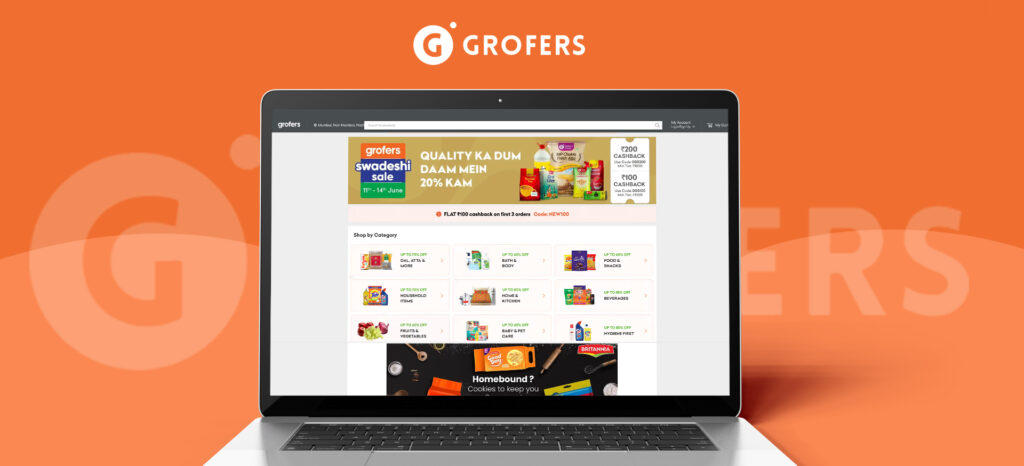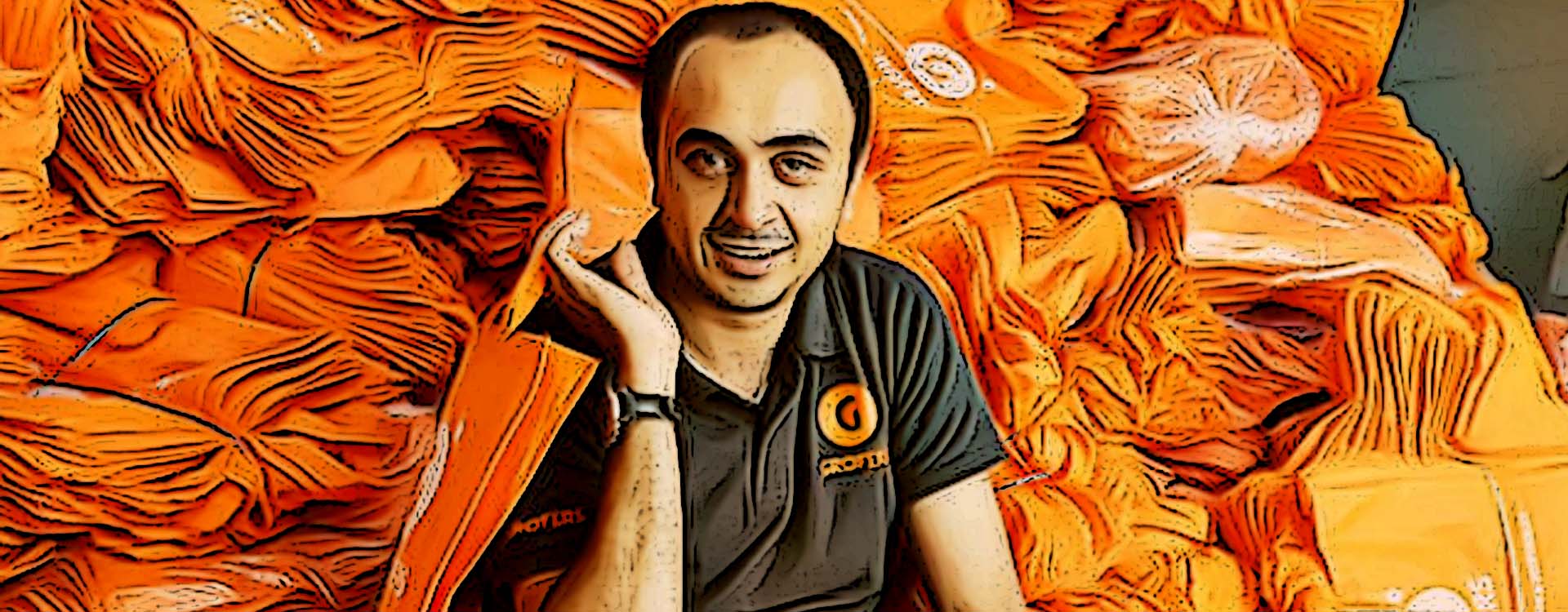The average Indian household is incomplete without having to make daily trips to the local paan dukan or kirana. We all have memories of running down to the shop across the road to pick up ingredients for that one special meal your mother would make on Sundays or more realistically, when she was expecting guests. Be it for staples like bread, milk, eggs or for more specific items, this daily act has for generations been embedded in the Indian culture so passively that it would be almost impossible to think of an alternative to procure them. Well, that is the challenge every entrepreneur faces – conventionality. To change the way people carry out their day-to-day functioning is no easy task, but Albinder Dhindsa is not one to go down without a fight. The fight here being the inception of a massive online grocery platform with a valuation of approximately $115 million – Grofers.
A Grain of Salt: The Early Years of Albinder Dhindsa
Not all entrepreneurs are cut from the same cloth and Albinder Dhindsa’s story is a strong advocate of that notion. Born and brought up in Patiala, Punjab, Dhindsa went on to create a rather impressive track record before trying his hands at entrepreneurship.
He had no intention of slowing down after completing his Bachelors in Technology from prestigious IIT Delhi, following which he kickstarted his career in the field of transportation and logistics. Having acquired valuable experience at URS Corporations (2005) and Cambridge Systematics (2007) as a Transportation Analyst and Senior Associate, respectively, Albinder Dhindsa was not satisfied with his current position.
With a desire to explore more in the field and a strong intention of starting his own business, he decided to take a leap of faith by quitting his job in pursuit of a Master’s in Business Administration from Columbia University.
It was in the United States where Dhindsa met Saurabh Kumar (Co-founder and COO of Grofers), who would go on to play an important role in the success that was to come towards their start-up. The duo met during their respective stints at Cambridge Systematics and instantly clicked owing to their shared interest in the field of logistics and transportation besides similar backgrounds. Although they did not have any intention of launching a start-up together at that time, they did keep in touch.
After completing his MBA, Dhindsa attempted to apply what he had learnt on home ground and picked up a job at popular food delivery company, Zomato as the head of international operations. He spent almost 3 years at the company, absorbing as much first-hand information as he could about supply chains and the workings of a company in the delivery sector.
‘‘
Even though the market was so saturated, this entrepreneur realised that hyperlocal was the key to success - the untapped goldmine.
How a Personal Touch Reinvented a Company
All this while, Dhindsa and Kumar remained in touch and brainstormed occasionally over new ideas. The former’s analytical skills came into play when he, along with the latter noticed that the delivery system in India was in absolute chaos. Even though there were many big players in the logistics or hyperlocal delivery at that time, there was a lack of communication due to which customer service was not being optimised. In other words, they had discovered that if the hyper-local market space was tackled in the right way, the results could increase tenfold.
Albinder Dhindsa had very smartly identified this opportunity before any other firm, which goes to show that the entrepreneurial trait was prevalent in him which got activated when he saw the business opportunity in the gap. Working at Zomato was like a pool of information and first-hand experience regarding the food supply chain for Dhindsa and acted as a catalyst to push the entrepreneur to take the plunge. It was during his stint at Zomato itself that he, along with Kumar, began working on his ambitious project – Grofers.
The two were so sure of their observation that they started their first company, OneNumber in 2013. Initially, they were just a delivery company that focused on dropping and picking up items around the neighbourhood. These items could be anything from groceries to cosmetics to accessories among others. They had a small team of delivery boys who worked much like Uber drivers. As soon as an order was placed by a customer, the nearest delivery boy would pick up the item and have it delivered.
Having personally spoken to small merchants and shop owners, Albinder Dhindsa knew too well the problems faced by them. In fact, the two carried out around 50-60 deliveries within a 4km radius themselves to understand the hindrances in such an unorganised system of delivery.
Although OneNumber did see success, Dhindsa felt that the flaws in the hyper-local market in India were not exploited enough. He had his eye on the bigger picture.
Despite having a wide range of businesses sign up with them, they found that the majority of the orders came from groceries and pharmacies. With that, the concept of an e-commerce platform solely for the purpose of grocery shopping came into being and OneNumber was rechristened Grofers.
Grofers started as a B2B model but shifted to a B2C soon. They facilitate delivery of almost 20,000 different products spread over categories like grocery, bakery items, cosmetics, fruits and vegetables, meat, dairy, flowers, toys, accessories, personal and baby care, among others in a maximum of 90 minutes!
Dhindsa, being a man from humble beginnings, understood that customers value reliability above everything. To get customers to trust an e-commerce platform to handle their grocery shopping proved to be quite a task. Moreover, to get smaller merchants to sign up for their services was even more challenging. However, Dhindsa was determined to create a system that worked for everyone. Thus, he gave top priority to the merchants. The sign-up process was made extremely easy.
Another important aspect that worked in the founder’s favour was his belief in treating the customers and merchants the same. He understood the importance it would have in spreading awareness of the brand. Dhindsa knew exactly how to build a strong, organic user base, and within no time the brand established itself as a force to be reckoned with.
That being said, they were only breaking even despite having moved products worth almost 8 lakhs within 3 months.
Grofers had a seed funding of just $500k which came from Sequoia Capital followed by a Series A funding of $10 million by the same investor along with Tiger Global Management in 2015. By November 2015, the company had managed to raise $120 million in funding although that was not reflecting in their performance. By the end of 2016, they had reported an annual loss of Rs 225 crore and continued to do so for the following months.
After they were forced to lay off 10 per cent of their staff and temporarily suspend services, Dhindsa had to come up with new ways to actually get the ball rolling.

Albinder Dhindsa: Moving Beyond the Fear of Failure
To keep the start-up up and running successfully, it was important for Albinder Dhindsa to expand Grofer’s reach in such a way that it did not hamper its customer service. His move to launch a mobile application for Grofers was probably what saved the company from losing its influence in the hyper-local market. They provided their customers with a quick and easy way of doing their grocery shopping, with just a click of a button. When it comes to grocery shopping, there are three options to possibly choose from. One could either go to your local kirana, a store like Spencer’s or more, or a superstore like Big Bazaar.
Albinder Dhindsa’s vision is to eliminate the above mentioned options and solidify the start-up as the one-stop destination for everyday needs. Quite a bold claim considering the competition in the market but not a shred of doubt is seen in his future plans for the company.
Despite making changes, Dhindsa found that the whole delivery process would be much smoother if they took supply in their own hands. By cutting out the middlemen in the convoluted supply chain, the company could save valuable time and resources by dealing directly with companies.
A strong and proactive supply chain was mandatory to keep the company afloat. Dhindsa ensured this by maintaining a good network of retailers, manufacturers and distributors. The bond shared was symbiotic, improving the overall performance of the company.
A whole lot of investment was needed for this. At the preliminary level, no investor wanted to get into a business that was not making ‘enough’ revenue. Gradually, Dhindsa and Umar managed to convince traders and set up 60,000 sq. Ft. Storage facilities in Delhi, Bengaluru, and Gurgaon. The business began scaling up from 2017 and the average order fee shot up.
Dhindsa maintained transparency by integrating a rating system in the app which allowed users and the company itself to monitor the performance of the merchants. Any merchant with a rating of below 4 gets removed from the platform. The company also keeps a strict check on how efficiently orders are being processed. This attention to detail was reflective of the ideator’s qualities and brought the start-up into the limelight and by the looks of it, they are here to stay there.
Grofers is not the first online grocer to have their own supply chain, but they are definitely among the fastest growing ones, owing it to Dhindsa’s aversion to complacency. He knew what needed to be done to plunge Grofers into the hyper-local market space and give firms like BigBasket and JioMart a run for their money.
Dhindsa remained unfazed by the adversities and left no stone unturned to find new methods to expand. By focusing on the supply chain rather than the products, Dhindsa managed to create a massive network that provides top quality service at a reasonable price.
‘‘
Dhindsa envisioned a one-stop-shop for all the grocery needs of the customer, which is one of the reasons Grofers is such a rapidly growing giant.
Proceed to Checkout
Grocery shopping, unlike shopping for clothes or other accessories, is relatively simple. There is no hassle of doubting the size, colour or fit of the item. Therefore, Dhindsa stressed the importance of having a user-friendly application. Numbers and statistics aside, Dhindsa’s frankness helped him understand consumer behaviour better and that ultimately helped him win over a significant share of the market in a relatively short span of time.
After almost 8 months of contracting farmers and setting up connections over the country, as of today they have above 400 products under their name. With customer acquisition and retention being their top priority, Albinder Dhindsa is set to expand his reach and revolutionise grocery shopping in years to come.




